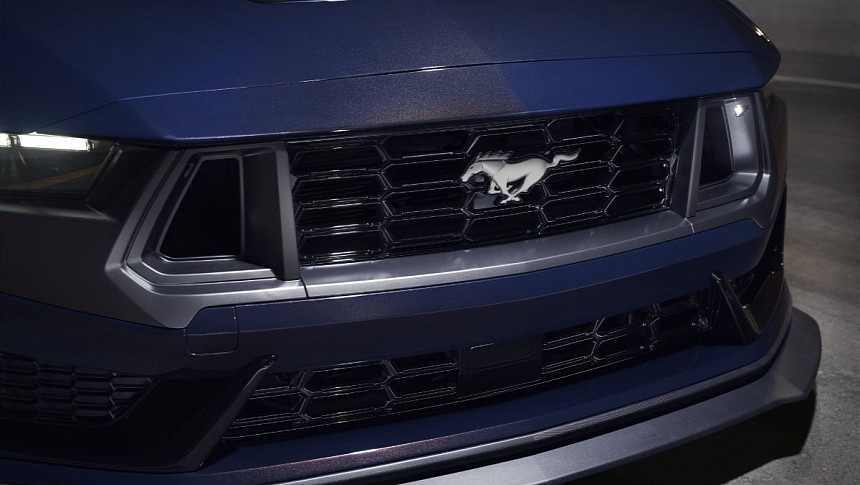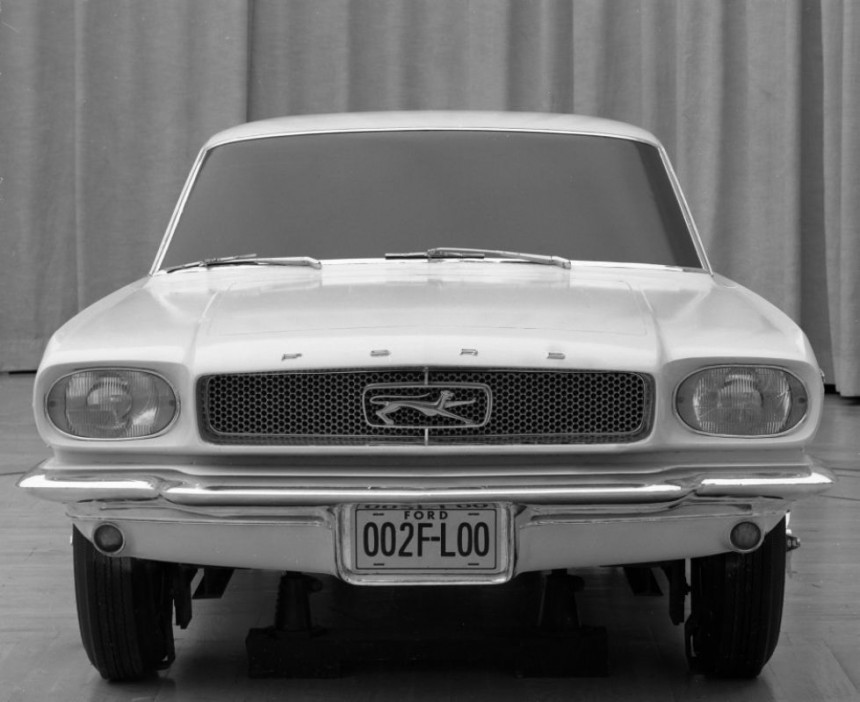Mustang, a name that glides off the tongue with ease, has become a permanent fixture in the world of automobiles for almost six decades.
With the mere mention of its name, visions of V8 power, a lengthy hood, and a truncated rear deck come to mind. When Ford decided to launch their pony car midway through the 1964 model year, it was a bold gamble, but one that has paid off handsomely over time, making it one of the top-selling cars globally.
Although at its core, the Mustang was nothing more than a Falcon with a sleek body, its unique style and panache made it an instant hit, a legacy that continues to resonate with car enthusiasts around the world. The name carries with it the image of a spirited stallion with V8 power and an affordable price tag that doesn't break the bank. The Ford Mustang has one of the lengthiest production runs in automotive history, and with that came the birth of legends and myths surrounding the original pony car. The car's name has been the subject of debate for decades, with many historians believing it to be sourced from the P-51 Mustang fighter plane from World War II.
However, not everyone agrees with this theory, and the true origins of the name have become murky with disinformation. Former Ford designer and executive stylist John Najjar played a crucial role in the Mustang's development and was fascinated with WWII aircraft. He believed that the P-51's legendary speed was worthy of being immortalized in automotive form. But some historians insist that the car was named after the SMU Mustangs, a college football team that Ford's Lee Iacocca found inspirational.
Even the Mustang's iconic horse emblem is almost identical to the team's logo, except for the direction in which the horse is running. Another theory involves Robert J. Eggert, one of Ford's marketing managers, who proposed the name after reading it in a book. Despite all this, Ford has never definitively confirmed how or why the car got its name.
The origins of the Mustang's name have been shrouded in mystery, but the association with the majestic stallion had endured, even during the Fox-body years when the emblem was absent. Legend has it that when John Najjar proposed the name to Ford executives, they were hesitant, fearing that the public would think of aircraft rather than cars. They even had other names in mind, like Cougar, which they deemed more marketable. Marketing played a vital role in the Mustang's success, especially since it was essentially a revamped Falcon. The right imagery was crucial to convincing buyers that this was a whole new car. And nothing embodied the spirit of the Mustang better than the image of a wild stallion, ready to gallop off into the sunset.
In 1964, Ford took a leap of faith and christened their new car, the Mustang, a decision that would etch the name into the collective consciousness for generations to come. The Mustang's name starkly contrasted its humble beginnings as a reworked Ford Falcon. Ford had initially considered calling it the Cougar, but that name ended up on a Mercury model a few years later. According to Frank Thomas, Ford's former research executive, the name Mustang was chosen because it symbolized the thrill of wide-open spaces and the essence of the American spirit. And boy did that name live up to its reputation. The Mustang became an icon of American culture, embodying the freedom, power, and adventure that defined the American dream.
During the tumultuous 1970s, the once-popular Ford Mustang suffered the same fate as many domestic cars, being crippled by emissions regulations and safety standards that starkly contrasted the real performance the brand was known for. Despite a brief respite with the Mustang II, the popularity of Japanese imports and the rise of front-wheel drive cars in the 1980s put pressure on Ford to make some drastic changes. Enter the Probe, a Mazda-based FWD coupe that was poised to replace the beloved Mustang.
The public outcry was intense, leading to Ford's decision to develop the SN95 Mustang, which ultimately saved the nameplate from extinction. But the story doesn't end there. Ford has recently taken a bold move, affixing the Mustang name to the Mach E, an electric SUV that some see as the complete opposite of what the Mustang once represented. As they say, be careful what you wish for.
Despite the initial backlash to the idea of a Mustang-branded electric SUV, Ford seems confident that the Mach E will appeal to both traditional Mustang fans and a new generation of environmentally conscious drivers. The car features sleek styling and impressive performance, with a range of up to 300 miles on a single charge. While it may not have the throaty roar of a classic V8 Mustang, the Mach E's electric powertrain provides instant torque and lightning-fast acceleration. Of course, not everyone is convinced that the Mach E is a true Mustang. Some purists argue that the car's name and branding are simply a marketing ploy to capitalize on the Mustang's popularity. Others feel that an electric SUV has no place in the Mustang lineup and that the car strays too far from the model's roots.
Regardless of where you stand on the issue, there's no denying that the Mustang's legacy continues to loom large over the automotive industry. From its humble beginnings as a sporty little car with a cool name to its current status as a global icon, the Mustang has remained a cultural touchstone for over 50 years. And who knows? Maybe in another 50 years, we'll be talking about the latest evolution of the Mustang, whatever form it may take.
Although at its core, the Mustang was nothing more than a Falcon with a sleek body, its unique style and panache made it an instant hit, a legacy that continues to resonate with car enthusiasts around the world. The name carries with it the image of a spirited stallion with V8 power and an affordable price tag that doesn't break the bank. The Ford Mustang has one of the lengthiest production runs in automotive history, and with that came the birth of legends and myths surrounding the original pony car. The car's name has been the subject of debate for decades, with many historians believing it to be sourced from the P-51 Mustang fighter plane from World War II.
However, not everyone agrees with this theory, and the true origins of the name have become murky with disinformation. Former Ford designer and executive stylist John Najjar played a crucial role in the Mustang's development and was fascinated with WWII aircraft. He believed that the P-51's legendary speed was worthy of being immortalized in automotive form. But some historians insist that the car was named after the SMU Mustangs, a college football team that Ford's Lee Iacocca found inspirational.
Even the Mustang's iconic horse emblem is almost identical to the team's logo, except for the direction in which the horse is running. Another theory involves Robert J. Eggert, one of Ford's marketing managers, who proposed the name after reading it in a book. Despite all this, Ford has never definitively confirmed how or why the car got its name.
In 1964, Ford took a leap of faith and christened their new car, the Mustang, a decision that would etch the name into the collective consciousness for generations to come. The Mustang's name starkly contrasted its humble beginnings as a reworked Ford Falcon. Ford had initially considered calling it the Cougar, but that name ended up on a Mercury model a few years later. According to Frank Thomas, Ford's former research executive, the name Mustang was chosen because it symbolized the thrill of wide-open spaces and the essence of the American spirit. And boy did that name live up to its reputation. The Mustang became an icon of American culture, embodying the freedom, power, and adventure that defined the American dream.
During the tumultuous 1970s, the once-popular Ford Mustang suffered the same fate as many domestic cars, being crippled by emissions regulations and safety standards that starkly contrasted the real performance the brand was known for. Despite a brief respite with the Mustang II, the popularity of Japanese imports and the rise of front-wheel drive cars in the 1980s put pressure on Ford to make some drastic changes. Enter the Probe, a Mazda-based FWD coupe that was poised to replace the beloved Mustang.
The public outcry was intense, leading to Ford's decision to develop the SN95 Mustang, which ultimately saved the nameplate from extinction. But the story doesn't end there. Ford has recently taken a bold move, affixing the Mustang name to the Mach E, an electric SUV that some see as the complete opposite of what the Mustang once represented. As they say, be careful what you wish for.
Regardless of where you stand on the issue, there's no denying that the Mustang's legacy continues to loom large over the automotive industry. From its humble beginnings as a sporty little car with a cool name to its current status as a global icon, the Mustang has remained a cultural touchstone for over 50 years. And who knows? Maybe in another 50 years, we'll be talking about the latest evolution of the Mustang, whatever form it may take.



